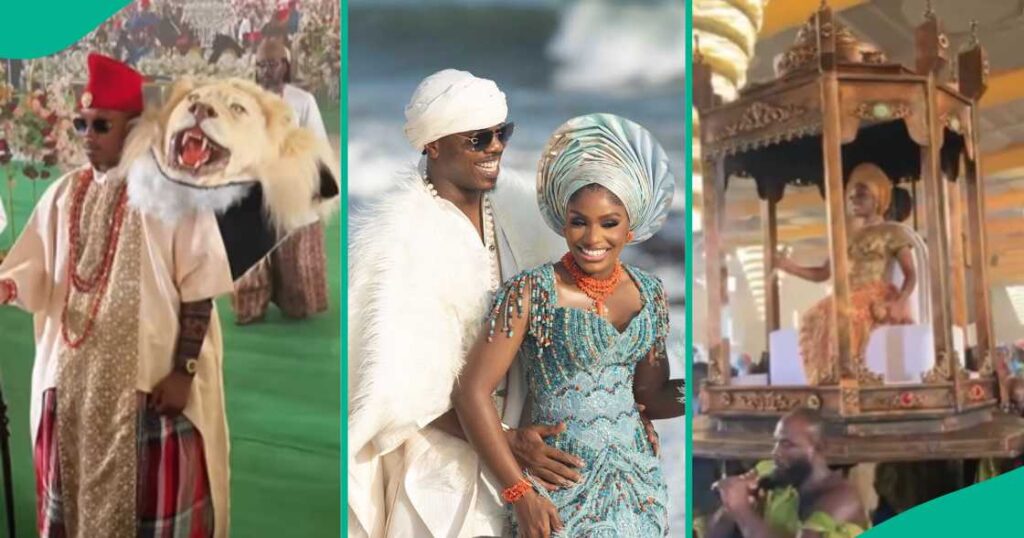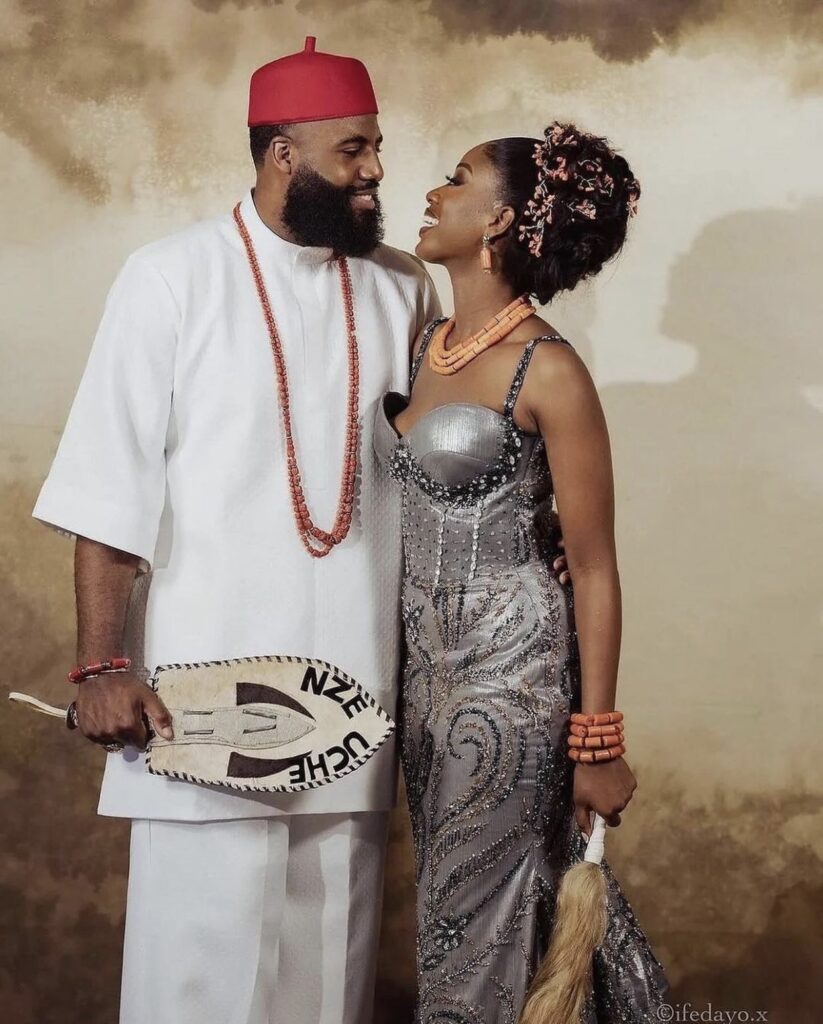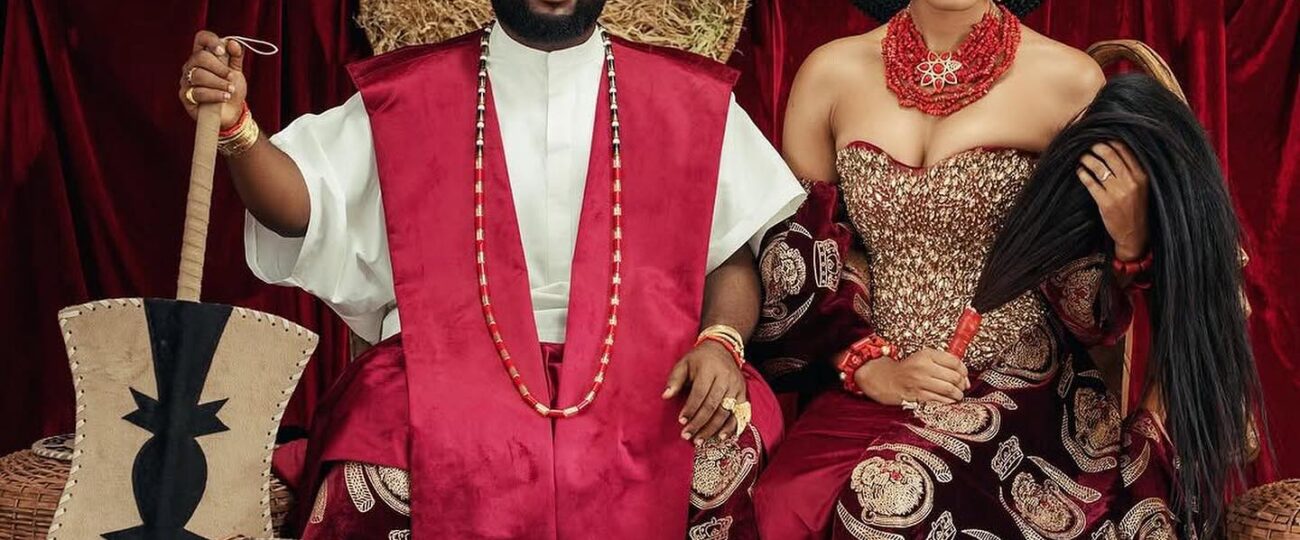Nigerian weddings are celebrated for their rich cultural tapestry and extravagant flair, often blending traditional rituals with modern touches. These events are not just about uniting two individuals but also about bringing together families and communities in a display of love and joy. They typically involve multiple ceremonies, such as a traditional wedding and a white wedding, each with its own unique elements.
Traditional Elements
Modern Trends and Examples
In 2025, trends like regal ball gowns, capes with African flair, and sustainable fabrics are shaping Nigerian weddings, reflecting a balance of tradition and modernity. Famous weddings, such as Fatima Dangote and Jamil Abubakar’s three-day event at Eko Hotel and Suites in Lagos, attended by Bill Gates, Dr Ernest Azudialu Obiejesi daughter and Chief Bishop Emma Okonkwo Son wedding or Folarin Alakija and Nazanin Jafarian Ghaissarifa’s £5m London wedding, showcase the extravagance. Celebrity weddings like Banky W and Adesua Etomi’s, with events in Lagos and South Africa, further illustrate this flamboyance.

Key traditions include the dowry or bride price, where the groom’s family fulfills a list of items, symbolizing commitment. Double ceremonies are common, with a cultural event honoring heritage and a Western-style wedding. The lack of a strict guest list means large, inclusive gatherings, often with an emce adding entertainment. Attire like Ichafu or Gele (headpiece) and Aso-Ebi (coordinated family outfits) adds visual splendor, while rituals like prostration and the cutting of the wedding cake during the cultural ceremony highlight family values. Food, often a lavish feast including jollof rice, Ukwa, Abacha and Akpu, is central to the celebration.
Survey Note: Exploring the Flamboyant Nature of Nigerian Weddings
Nigerian weddings are a vibrant celebration of love, culture, and community, renowned for their grandeur and extravagance. These events are not merely the union of two individuals but a significant cultural milestone that brings together families and entire communities, often spanning multiple days with a blend of traditional and modern elements. This survey note delves into the rich traditions, historical examples, and emerging trends that define the flamboyant splendor of Nigerian weddings, particularly as observed in 2025.
Historical and Cultural Context
Nigerian weddings are deeply rooted in the country’s diverse ethnic landscape, with over 250 ethnic groups, including major tribes like Igbo, Yoruba, and Hausa, each contributing unique customs. The flamboyance stems from the communal nature of these celebrations, where the entire community is invited, and the event is seen as a joining of families rather than just individuals. This inclusivity is evident in the tradition of having no strict guest list, as noted in various cultural wedding guides, such as 10 Nigerian Wedding Traditions & Customs We Love!.
The historical significance is further highlighted by the dowry or bride price tradition, where the groom’s family must fulfill a list of items provided by the bride’s family. This can range from simple gifts like fruits and candies to more substantial items like a new car, symbolizing the groom’s commitment and the union of two families. This practice, detailed in sources like Diverse Nigerian Wedding Traditions and Customs, adds a layer of formality and grandeur to the proceedings.

Key Traditional Elements
Several traditions contribute to the flamboyant nature of Nigerian weddings, as outlined in detailed wedding planning resources:
- Double Ceremonies: Many Nigerian couples, especially those in the diaspora, opt for two ceremonies: a traditional wedding that honors cultural heritage and a white wedding that follows Western traditions. Each ceremony has its own officiants and rituals, making the wedding a multi-day affair. This is evident from accounts like Nine Nigerian Wedding Traditions to Know, According to Experts, which emphasize the personalization and heritage focus.
- Alaga (Emcee): The Alaga, a female emcee, plays a crucial role in entertaining guests by heckling the groom and his friends, turning the ceremony into a lively, interactive event filled with laughter, music, and dance. This tradition, as described in Nigerian Wedding Traditions — THE HAUS OF GREY, adds a theatrical element to the celebration.
- Gele and Aso-Ebi (Attire): The Gele is a traditional headpiece worn by the bride, bridesmaids, and sometimes the groom (in the form of Fila), while Aso-Ebi refers to coordinated outfits worn by the families, with specific colors assigned to each side. This creates a visually stunning effect, as seen in wedding photos and descriptions from The Ultimate Guide to Nigerian Wedding Traditions For Yoruba Weddings.
- Proposal and Acceptance: The groom traditionally writes a letter of intent, read aloud during the ceremony, with the bride’s family giving their acceptance, formalizing the union in a public and ceremonial way. This ritual, noted in What to Expect at a Nigerian Wedding: Nigerian Wedding Traditions Explained, adds a formal touch to the proceedings.
- Prostration: The groom and his groomsmen prostrate before the bride’s family and his own parents as a sign of respect, highlighting the importance of family in Nigerian culture. This gesture, detailed in Traditional Nigerian Wedding Customs: The Ultimate Nigerian Wedding Checklist Blog Wezoree, underscores the communal and respectful nature of the event.
- Wedding Cake and Food: The wedding cake is often cut during the cultural ceremony to symbolize the couple’s shared future filled with sweetness, unlike in Western weddings where it’s typically at the reception. Food is central, with the bride’s family traditionally preparing the meal or caterers providing a feast including jollof rice, grilled chicken, and amala, ensuring no guest leaves hungry. This is highlighted in Nigerian Wedding Ceremony Traditions: The Essential Guide to Nigerian Wedding Food and Menu Planning.
These elements collectively contribute to the flamboyant and festive atmosphere, with large gatherings, vibrant attire, and abundant food creating a memorable experience.
Famous Luxurious Nigerian Weddings: Historical Examples
The extravagance of Nigerian weddings is best illustrated by some of the most luxurious weddings in the country’s history, as documented in sources like 13 Most Luxurious Wedding In Nigeria- ( All Time Expensive Wedding ).. Below is a table summarizing notable examples:
| Wedding Couple | Details | Estimated Cost | Location(s) | Notable Attendees | Date |
|---|---|---|---|---|---|
| Fatima Dangote and Jamil Abubakar | Daughter of Aliko Dangote, 3-day event, grand finale at Eko Hotel and Suites, Lagos | Not specified | Kano, Abuja, Lagos | Bill Gates | Not specified |
| Folarin Alakija and Nazanin Jafarian Ghaissarifa | Son of Folorunsho Alakija, £5m (N2.4bn), held in London | £5m (N2.4bn) | London | Shanina Shaik, Mr Eazi, Robin Thicke | Not specified |
| Banky W and Adesua Etomi | Traditional in Lagos, white in South Africa, trended for weeks | Not specified | Lagos, South Africa | Celebrities | Not specified |
These weddings, such as Fatima Dangote’s three-day event attended by Bill Gates, or Folarin Alakija’s £5m London wedding with celebrities like Shanina Shaik, showcase the financial investment and cultural significance. Banky W and Adesua Etomi’s wedding, with events in Lagos and South Africa, further illustrates the trend of celebrity weddings that become social media sensations, highlighting the flamboyant nature through stunning attire and live performances.
Modern Trends in 2025: Evolution and Innovation
As of April 2025, Nigerian weddings are evolving, incorporating contemporary trends while staying true to their roots, as seen in recent wedding fashion guides like 2025 Wedding Gown Trends Every Nigerian Bride Should Know. The following table summarizes key trends:
| Trend Category | Details | Hadassah Tip |
|---|---|---|
| Regal Ball Gowns | Exaggerated skirts, detailed bodices, luxurious fabrics like mikado, satin | Add a sparkling tiara or statement earrings |
| Capes with African Flair | Embellishments like pearls, lace, Ankara-inspired accents, detachable features | Choose a cape with detachable features for reception transformation |
| Statement Sleeves | Puffed shoulders, sheer, beaded details, bold, glamorous styles | Pair with a fitted silhouette to balance the look |
| Sheer Fabrics with Modesty | Illusion fabrics, delicate lace or beadwork, for church or conservative themes | Customize sheer details for comfort and personal style |
| Luxurious Sustainable Fabrics | Organic fabrics, locally sourced materials, renting gowns popular | Rental collection includes first-wear options, ensuring eco-friendly luxury |
| Vibrant Colour Accents | Champagne, blush, gold accents, fully coloured gowns for reception | Consider gown with gold or blush undertones for a unique twist |
| 3D Floral Appliqués with Elegance | Bold, intricate designs, stunning for outdoor/garden weddings | Match with bouquet featuring similar blooms for cohesive look |
| Cultural Fusion Styles | Blending traditional and modern, e.g., corset with aso-oke lace patterns | Work with designer to incorporate personal heritage touches |
These trends reflect a desire to honor tradition while embracing modernity and sustainability. For instance, regal ball gowns with exaggerated skirts and detailed bodices, often in luxurious fabrics like mikado and satin, add a touch of royalty. Capes with African flair, embellished with pearls or Ankara designs, celebrate cultural heritage, while sustainable fabrics and gown rentals highlight environmental consciousness. Vibrant color accents, such as champagne or gold, and 3D floral appliqués for outdoor weddings, further enhance the visual spectacle.
Cultural Significance
Nigerian weddings, as of April 2025, remain a beautiful blend of tradition, culture, and modern extravagance. They are celebrations that go beyond the union of two people, bringing together communities in a display of love, respect, and joy. From the intricate rituals like dowry presentations and prostrations to the dazzling attire like Gele and Aso-Ebi, every aspect is designed to be memorable. The flamboyance is amplified by lavish feasts, lively music, and grand receptions that can last for days, as seen in historical examples like Fatima Dangote’s wedding and contemporary trends like sustainable bridal fashion. These weddings continue to evolve, incorporating new trends while remaining true to their roots, ensuring each celebration is as unique as the couple getting married.

